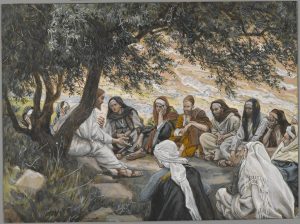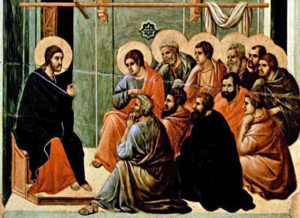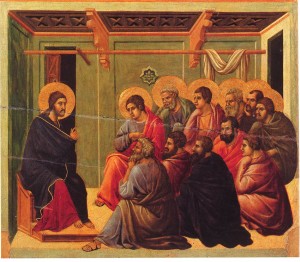Thoughts on Sunday’s Lessons for May 5, 2024 (Easter 6B)

The Last Supper (1464-1467), oil painting on panel by Dieric Bouts (c.1420-1475), Altarpiece, St. Peter’s Church, Leuven, Belgium. (Click image to enlarge.)
First Reading: Acts 10:44-48
Sunday’s readings build on the theme that we heard last Sunday: God’s love pours out on all the world, and we are called to love each other as God loves us. Our first reading marks a key turning point in Acts: The joyful reaction of a Gentile crowd to Peter’s teaching reveals to the apostles that the Holy Spirit comes to everyone, not only Jewish Christians but Gentiles too. Everyone. Peter asks, “Can anyone withhold the water for baptizing these people who have received the Holy Spirit just as we have?” The answer is clear: Baptism is for all. As we heard in last week’s reading about the Ethiopian eunuch, “Here is water. What is to prevent it?”
Psalm: Psalm 98
Filled with triumphant spirit, Psalm 98 rings out a resounding faith in God’s power to win victory for Israel over all the earth. This is an occasion for rejoicing, calling not only for the people but for all the earth – the sea, the rivers and the hills – to lift up their voices and sing. Consistent with the theme that runs through this day’s readings, God’s victory is not for Israel alone. God will judge not only Israel but all the people of the earth with mercy and equity.
Second Reading: 1 John 5:1-6
Our second reading and Gospel this week continue seamlessly where last Sunday’s readings left off, expanding on similar themes. We are commanded to love one another as Jesus loves us. Now we learn in the First Letter of John that the way to love God – to become a child of God – is by obeying God’s commandments, a direction that follows the Jewish tradition of love for God’s law and teaching. In words that echo the triumphant sentiment of today’s Psalm, we hear that our faith in Jesus Christ as the Son of God brings God’s victory into the world.
Gospel: John 15:9-17
Mark’s, Matthew’s and Luke’s Gospels all three tell us that Jesus taught – in the spirit of the essential Jewish prayer, the Shema – that the greatest commandment is to love God with all our heart and soul and strength and mind, and to love our neighbor as ourselves. Now in John’s Gospel we hear Jesus expanding on this theme. Just as God has loved Jesus, he tells his apostles during his final discourse, so Jesus loves us. Therefore, he tells them, “Love one another as I have loved you. No one has greater love than this, to lay down one’s life for one’s friends.” Through faith, he adds, continuing the metaphor of the vine and the branches from last week’s Gospel, we go out and bear fruit that will last.



